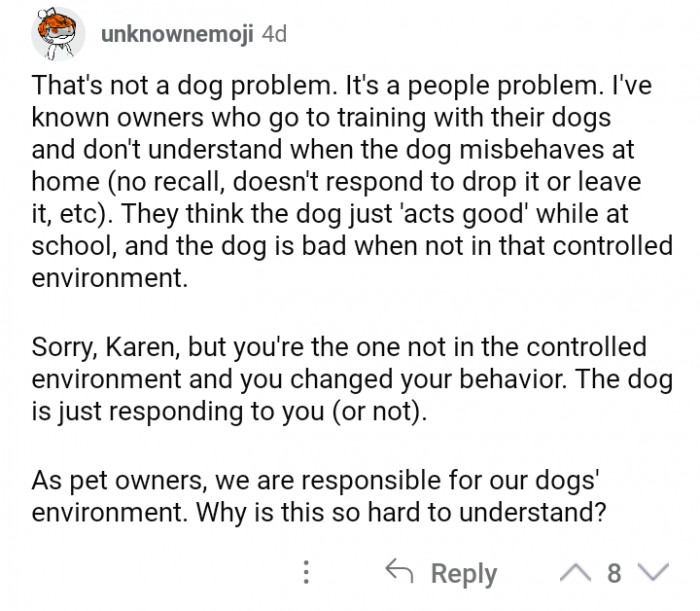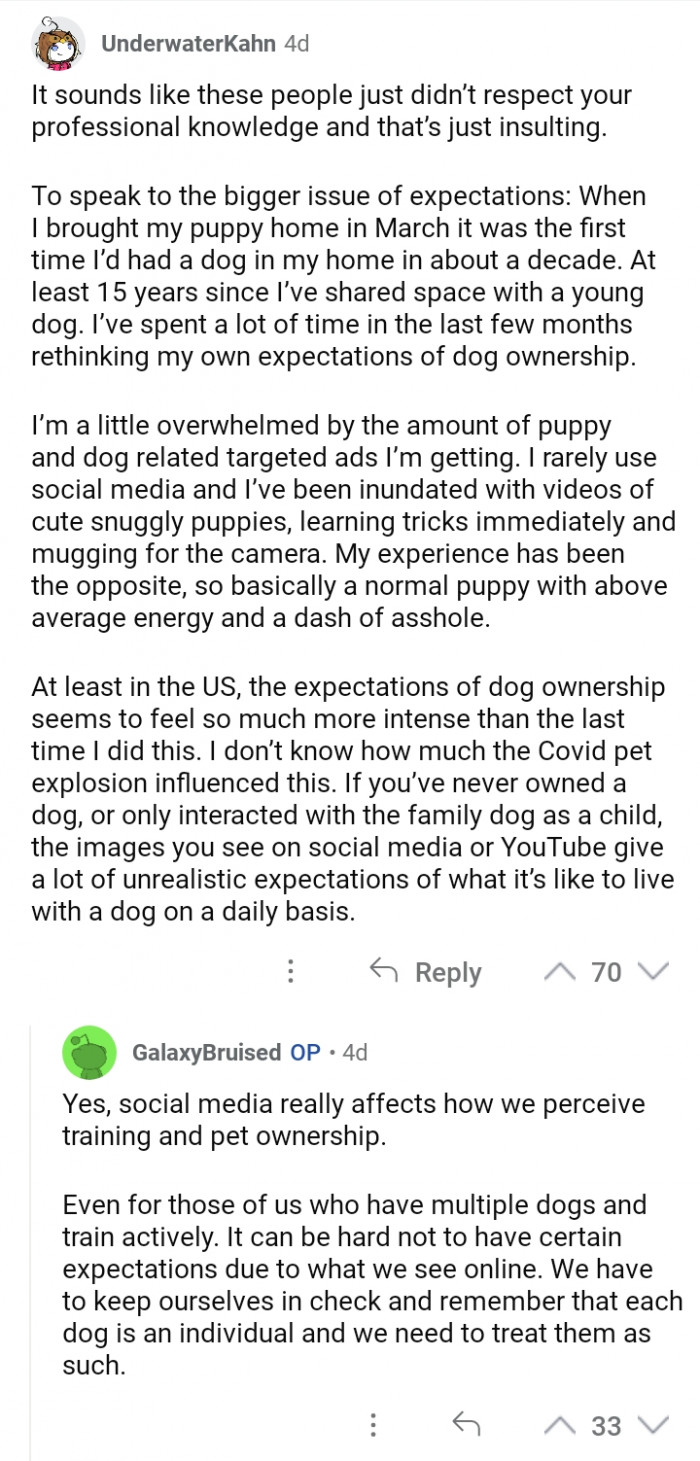Dog Trainer Is Infuriated Over These Dog Owners For Expecting Too Much From A New Dog And Disobeying Precautions
Shelter dogs who are adopted and brought into a new home might have been found on the streets, or their original owners might have surrendered them to the shelter's care. However, it doesn't matter if someone adopted a cheerful dog from the woods or brought up a pet that was neglected on the sidewalks by its previous owner; fur parents only want the best for their furry friends.
It takes effort and patience to properly care for a dog, as well as empathy and awareness on the part of the owner. A new pet has a unique and important adjustment period during its first several days in its new environment.
Unsure of where they are and what people expect from them, the rehomed puppy might experience an emotional roller coaster. To make the transition as smooth as possible for the dog, it is essential for both the rescuer or original owner and the family adopting the dog to establish clear boundaries and expectations.
How dog owners treat newly adopted dogs bothered a Reddit user who works as a trainer and also rehomes dogs. OP shared in the Reddit community how dog owners expect good outcomes when they don't follow precautions for raising a rehomed dog.
OP was frustrated with dog owners who expect too much from a new dog.

OP found out that after telling the dog owners about the precautions, they lied and eventually overexposed the dog, which should not have been done in the first place, considering his condition.

#1 This is how it should be.

Understanding the emotional landscape of newly adopted dogs is crucial for their successful transition into a home. Research in animal behavior highlights that shelter dogs often experience trauma from their previous environments, which can lead to behavioral challenges in a new setting. According to a study published in the Journal of Veterinary Behavior, dogs that have been abandoned or neglected may exhibit signs of anxiety, fear, and uncertainty when faced with new experiences or environments. These feelings can manifest in various ways, such as aggressive behaviors or withdrawal, making it essential for pet owners to approach their new companions with patience and understanding.
Moreover, positive reinforcement training methods can significantly aid in building trust and confidence in these animals. Research indicates that the use of rewards-based training not only improves obedience but also strengthens the bond between dog and owner, which is vital for successful integration into a family unit.
#2 I know man, I know.

#3 "I used to do a lot of animal training, but dealing with people absolutely ruined it. I just don't have the patience for them."

#4 Just stating some facts here.
"That's not a dog problem. It's a people problem," stated a Redditor.

Psychological Insights on Boundaries
When discussing the importance of respecting a dog’s boundaries, it’s helpful to consider the psychological principle of attachment theory. Dr. John Gray, a well-known relationship author, states, "Healthy relationships are built on trust and respect for personal space." In the context of pet ownership, respecting a dog's boundaries is crucial, as it fosters a secure attachment and reduces anxiety for the pet. Research has shown that pets who feel safe and secure in their environment are less likely to exhibit behavioral issues, such as aggression or excessive barking. According to Dr. Lisa Feldman Barrett, an emotion researcher, "Animals exposed to consistent, respectful interactions tend to develop a more stable emotional state." This highlights the importance of being attuned to a dog's body language and respecting its need for personal space as a critical component of responsible pet ownership. For more insights, visit Dr. Lisa Feldman Barrett's website and Dr. John Gray's website.
#5 Why do people fail to respect boundaries?

#6 People should really start paying attention.

#7 "Unlimited human stupidity."

The emotional toll on shelter dogs cannot be underestimated, as they often come with a history of trauma that impacts their behavior. Dr. John Gray, a relationship author and expert, emphasizes, "Just like humans, dogs can experience emotional distress from their past experiences, which can complicate their adjustment to a new home." Symptoms such as hypervigilance, fear of sudden movements, and avoidance behaviors are common and can lead to misunderstandings between owners and their new pets. Understanding these behaviors is vital for new owners, as it allows them to respond appropriately to their dog's needs. Dr. Angela Duckworth, a character researcher, suggests, "Creating a safe, designated space for the dog to retreat to can help them feel secure and facilitate their adjustment to the new environment." For more insights, visit Angela Duckworth's website.
#8 Human ego and their ill mindset.

#9 Adopting a pet is similar to parenting; make sure to commit and be proper.

#10 It is a matter of willingness to learn and acceptance.

Practical Strategies for New Owners
To ensure a smooth transition for both the dog and the owner, it is essential to implement evidence-based strategies that promote emotional well-being. According to Dr. Harvey Karp, a pediatrician and child development expert, "Gradual introductions to different areas of the home allow the dog to explore at its own pace, helping to reduce anxiety and build confidence." This method helps the dog learn to associate the new environment with positive experiences.
Additionally, establishing a consistent routine can provide a sense of stability for the dog. Dr. John Hattie, an education researcher, states that "animals thrive on predictability; therefore, feeding, walking, and playtime should occur at the same times each day." This predictability can significantly reduce stress for the animal and promote a sense of security in their new surroundings.
#11 Definitely frustrating.

#12 Even if we have had them for long, we still have to observe them.

#13 Indeed, the shared professional advice was taken for granted.

The process of adopting a shelter dog raises significant questions about the expectations placed on both the animal and the owner. According to Dr. Dan Siegel, a renowned child psychiatrist, “Unrealistic expectations can lead to frustration and disappointment, which may ultimately result in pets being returned to shelters.” He emphasizes that education and realistic goal-setting are essential for successful pet adoption. Educating potential adopters about the challenges and responsibilities of dog ownership can help mitigate these issues. By setting realistic expectations and preparing for the emotional labor involved in integrating a new dog into their lives, owners can foster a more harmonious relationship with their pets.
#14 Animals deserve MORE.

#15 Dogs and people have very similar thinking.

#16 Very sad man.

The Role of Empathy in Dog Ownership
Empathy plays a crucial role in the relationship between dogs and their owners. Research in social psychology indicates that empathetic responses can enhance the bond between humans and animals. A study from Harvard University found that individuals who practice empathy tend to exhibit more compassionate behaviors towards animals, leading to better care and understanding of their needs.
By cultivating empathy, dog owners can better interpret their pets' behaviors and needs, which is essential for creating a supportive environment. This not only improves the well-being of the dog but also enriches the owner's experience, leading to a more fulfilling companionship.
#17 Just don't hit them. Plain and simple.

#18 Poor dogs might be thinking why humans are hurtful.

#19 Good thing that this dog found a home that he deserved.

Ultimately, the emotional health of both the dog and its owner is paramount for a successful adoption experience. A significant body of research indicates that animals and humans can influence each other's emotional states, creating a reciprocal relationship that affects overall well-being. For example, studies have shown that owning a pet can reduce levels of cortisol, a stress hormone, in humans while simultaneously providing emotional support for the animal.
Thus, it is vital for new dog owners to prioritize their own emotional health through self-care practices, as this will directly impact their ability to nurture and care for their new pet effectively. Strategies like mindfulness, regular exercise, and even support groups for new pet owners can create a healthier dynamic in the pet-owner relationship.
#20 One of the cons of this modern generation.

People should be aware that dogs, like humans, also have their own boundaries. They might have a different way of communicating their needs and emotions.
A true dog lover or fur parent would be willing to make the extra effort to understand their unique way of expressing themselves. If you are eager to adopt a pet, then you should also accept the challenges of making the pet feel at home and connecting with you.
In conclusion, understanding the complexities of adopting a new pet, particularly a shelter dog, requires a blend of empathy, patience, and education. As research indicates, the emotional landscapes of both dogs and their owners play a crucial role in the success of these relationships. By adopting a thoughtful approach that respects the dog's boundaries and fosters trust, new owners can significantly enhance their experiences and ensure a positive outcome for both themselves and their pets. With the right knowledge and strategies, the journey of pet ownership can transform into a rewarding partnership that enriches the lives of both the animal and the human.



